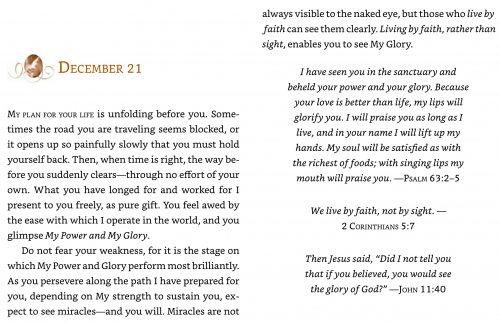Incarnation
The
Trajectory of Incarnation
Monday, December 21,
2020
Christianity’s true and unique story line has always been incarnation. That means that the spirit nature of reality (the spiritual, the immaterial, the formless) and the material nature of reality (the physical, that which we can see and touch) are one. They have always been one, ever since the Big Bang took place 13.7 billion years ago. The incarnation did not just happen when Jesus was born, although that is when we became aware of the human incarnation of God in Jesus. It seemingly took until 2,000 years ago for humanity to be ready for what Martin Buber (1878‒1965) called an I/Thou relationship with God. But matter and spirit have been one since “the beginning,” ever since God decided to manifest himself/herself as creation.
Our outer world and its inner significance must come together for there to be any wholeness and holiness. The result is both deep joy and a resounding sense of coherent beauty. What was personified in the body of Jesus was a manifestation of this one universal truth: matter is, and has always been, the hiding place for Spirit, forever offering itself to be discovered anew. Perhaps this is what Jesus means when he says, “I am the gate” (John 10:7). Francis of Assisi and his female companion, Clare, somehow knew that the beyond was not really beyond, but in the depths of here.
John Duns Scotus (1266–1308) took the intuition of Francis and made it into a philosophy. He said that Christ was not Plan B; God did not plan to remain absent until Adam and Eve ate that darn apple and Jesus had to come save us. Rather, Duns Scotus said that Christ was Plan A from the very beginning, the very first idea in the mind of God, as it were (John 1: 1–4). [1] God, the formless, eternal, and timeless One essentially said I am going to manifest who I am in what we now call physicality, materiality, or the universe.
This means that everything you have ever seen with your physical eyes is the mystery of incarnation. The Christian word we give to that is the Christ, which comes from the word Messiah, or the Anointed One, used by Jewish people. The Anointed One is the one who would come to reveal what God is doing, everywhere and all the time. For Christians, that became manifested in Jesus of Nazareth. Walter Brueggemann, my favorite scholar of the Hebrew Scriptures, would call this “the scandal of particularity.” [2] God is in a vulnerable newborn baby in a feeding trough. We need to see the mystery of incarnation in one ordinary concrete moment, and struggle with, fight, resist, and fall in love with it there. What is true in one particular place finally universalizes and ends up being true everywhere.
Incarnation
Birth
Is Just the Beginning
Sunday, December 20,
2020
We must move beyond a merely sentimental understanding of Christmas as “waiting for the baby Jesus” to an adult and communal appreciation of the message of the incarnation of God in Christ. We Franciscans have always believed that the incarnation was already the redemption, because in Jesus’ birth God was saying that it was good to be human, and God was on our side.
Jesus identified his own mission with what he called the coming “reign of God.” We have often settled instead for the sweet coming of a baby who asked little of us in terms of surrender, encounter, mutuality, or any assent to the actual teachings of Jesus. Too much sentimentality, or juicing up of our emotions, can be a substitute for an actual relationship, as we also see in our human relationships. When we are so infatuated with the “sweetness” or “perfection” of another, we easily “fall” out of love at the first sign of their humanity. Let’s not let that happen with the infinitely compelling person of Jesus!
The celebration of Christmas is not merely a sentimental waiting for a baby to be born. It is much more an asking for history to be born! Creation groans in its birth pains, waiting for our participation with God in its renewal (see Romans 8:20–23). We do the Gospel no favor when we make Jesus, the Eternal Christ, into a perpetual baby, who asks little or no adult response from us. One even wonders what kind of mind would want to keep Jesus a baby. Maybe only one that is content with “baby Christianity.”
Any spirituality that makes too much of the baby Jesus is perhaps not yet ready for “prime-time” life. God clearly wants friends and partners to be images of divinity, if we are to believe the biblical texts. God, it seems, wants mature religion and a thoughtful, free response from us. God loves us in partnership, with mutual give and take, and we eventually become the God that we love.
The Christ we are asking and waiting for includes our own full birth and the further birth of history and creation. It is to this adult and Cosmic Christ that we can say, “Come, Lord Jesus” (Revelation 22:20) with a whole new understanding and a deliberate passion. This makes our entire lives, and the life of the church, one huge “advent.”
The Christ includes the whole sweep of creation and history joined with him—and each of us, too. This is the Universal (or Cosmic) Christ. [1] We ourselves are members of the Body of Christ and the Universal Christ, even though we are not the historical Jesus. So we very rightly believe in “Jesus Christ,” and both words are essential.
